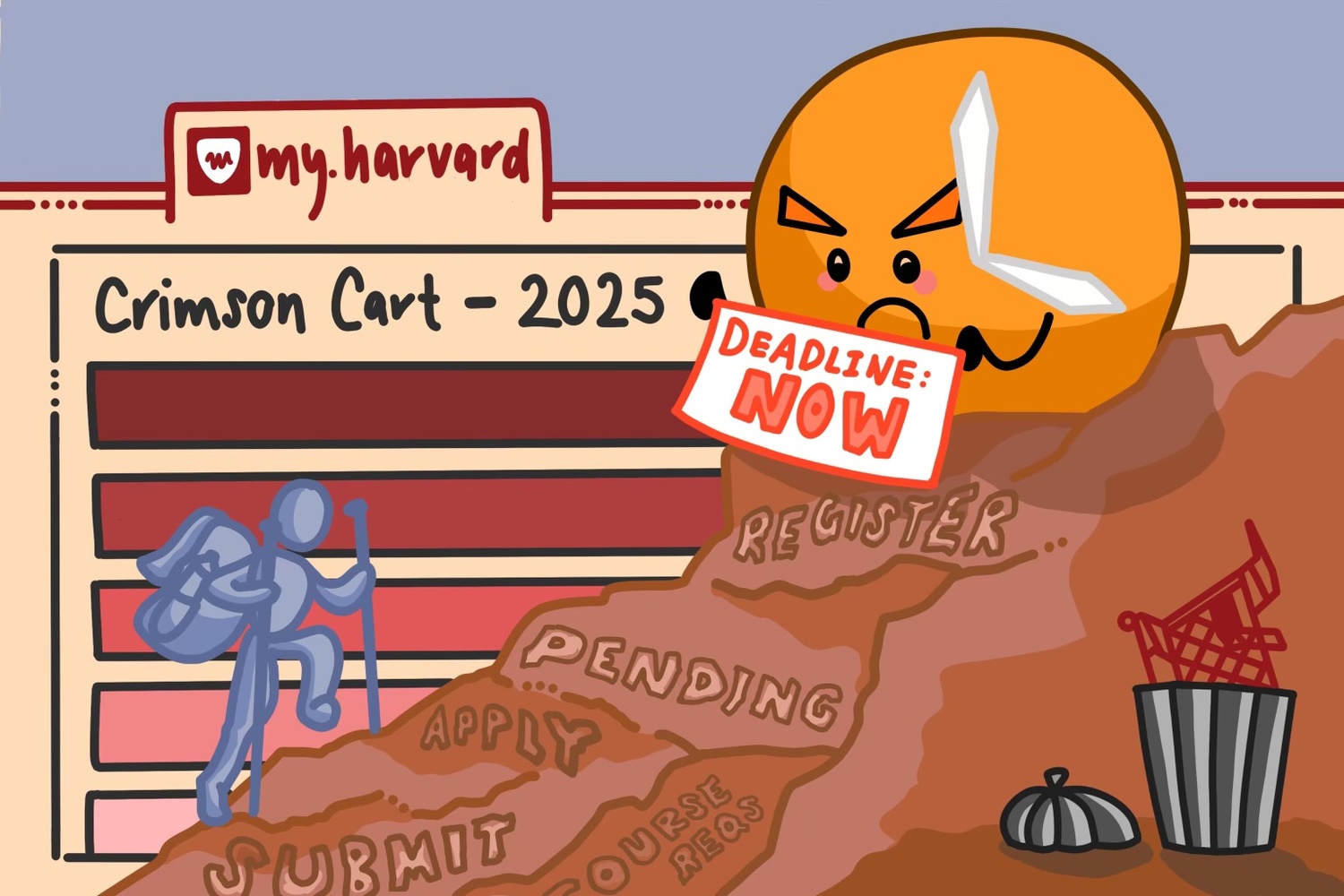
News
Harvard Grad Union Agrees To Bargain Without Ground Rules

News
Harvard Chabad Petitions to Change City Zoning Laws

News
Kestenbaum Files Opposition to Harvard’s Request for Documents

News
Harvard Agrees to a 1-Year $6 Million PILOT Agreement With the City of Cambridge

News
HUA Election Will Feature No Referenda or Survey Questions
Low Classroom Engagement? Blame Course Registration, Not Students.

Given Harvard’s reputation for academic excellence, you might expect classroom engagement to be high. You’d be wrong.
Recently, the Classroom Social Compact Committee released a report warning of “student curricular disengagement.” Their diagnosis might be apt, but their reported policy proposals miss one glaring issue: Student engagement is low because students aren’t taking classes that genuinely interest them — and Harvard’s course registration system is to blame.
The CSCC highlighted academic rigor in their report, proposing stricter attendance policies and citing faculty concerns about student curricular disengagement. In a similar vein, last semester the Faculty of Arts and Sciences approved an amendment to formalize the expectation that standard courses would require 12 hours of work per week.
This is a valiant effort by the FAS to rescue student engagement. It is also far from sufficient.
Reviving student engagement will require much broader structural changes to academics and culture — from both students and Harvard. The first step is fixing course registration.
Much to the chagrin of many students, course registration deadlines have crept earlier and earlier, while students have only three weeks of the semester to add or drop courses without incurring a fee. Consequently, many students fill their schedules with placeholder courses. Even worse, these strict deadlines can lock students into schedules they haven’t fully considered, especially given the lack of a formal shopping week.
Given this context, it is not difficult to understand the connection between the frenzy that is course registration and the lack of student engagement, as well as faculty concerns that students are skirting around a rigorous college experience.
Students can pray to the Q Guide gods and hope they manage to select optimal courses in their limited spare time during peak midterm season. Given the tight deadlines to do so, they risk that they miscalculated, bit off more than they could chew, and have to scramble to swap into whatever courses have seats left.
Alternatively, they can take the easier but safer route out by filling their schedule with “gems,” or the easiest classes possible, to avoid the hassle in the first place.
It is absolutely the responsibility of students to be mindful when building their schedules — taking only the easiest courses is a waste of the incredible wealth of knowledge available at Harvard.
But how is a student supposed to truly dedicate themself to a few classes that interest and challenge them when every class in their schedule is expected to meet an arbitrarily high minimum workload? The haphazard effort to eliminate easier courses at Harvard will only result in students being left without the ability to balance their course load.
It would be overly optimistic to assume all students pick their classes for the sake of intellectual fulfillment rather than an easy A. But that vision could be achieved through efforts like requiring advising meetings that emphasize creating a balanced yet challenging schedule.
The course registration system sets students up to select classes that don’t always match academic passion — which, of course, will lead to worse classroom engagement.
So yes, students have a responsibility to choose the courses that contribute most effectively to their academic and personal growth. Yet the College must also do its part to enable that decision making by fixing a course registration system that is currently antithetical to classroom engagement. Enrollment deadlines should be more generous, and, if it cannot be formally adopted, professors ought to create an informal culture of more forgiving first week assignment expectations to improve course selection.
Ultimately, we are students, not superhumans. Drastic administrative interventions that place excessive blame and unreasonable expectations on students represent a deeply imperfect attempt to boost student engagement.
Harvard must trust students to meet them in the middle, and, crucially, students must seize the opportunity to make that effort.
Layla L. Hijjawi ’27, a Crimson Editorial editor, is a Social Studies concentrator in Quincy House.
Want to keep up with breaking news? Subscribe to our email newsletter.
Most Read
- Harvard Dismisses Leaders of Center for Middle Eastern Studies
- Harvard Agrees to a 1-Year $6 Million PILOT Agreement With the City of Cambridge
- FAS Dean Asks Center Directors To Show Compliance With Viewpoint Diversity Guidance
- 2 Years After Affirmative Action Ruling, Harvard Admits Class of 2029 Without Releasing Data
- Adams House Resident Dean Issues Warning to Student Who Booked Room for AFRO Event
From Our Advertisers

Over 300+ courses at prestigious colleges and universities in the US and UK are at your disposal.

With innovative financial tools combined with financial education, Collegiate empowers students to take control of their finances and build confidence in their money management skills.

Serve as a proctor for Harvard Summer School (HSS) students, either in the Secondary School Program (SSP), General Program (GP), or Pre-College Program.

With an increasingly competitive Law School admissions process, it's important to understand what makes an applicant stand out.

Welcome to your one-stop gifting destination for men and women—it's like your neighborhood holiday shop, but way cooler.

Admit Expert is a premium MBA admissions consulting company, helping candidates secure admission to top B-schools across the globe with significant scholarships.
